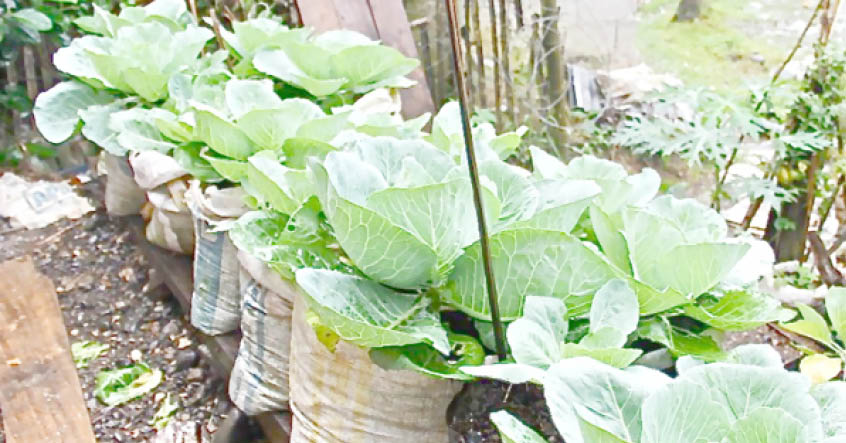AGRO SOLUTIONS: What to consider growing your food
Buraimoh Ummuani Kemi grows most of her foods despite not being an expert farmer. Through the farming experience she gained from her mother, she has grown to become a coach on farming. Many people have ventured into growing their plants; while some have failed, others have been successful. Women from different places have given suggestions […]

A backyard farm
Buraimoh Ummuani Kemi grows most of her foods despite not being an expert farmer. Through the farming experience she gained from her mother, she has grown to become a coach on farming.
Many people have ventured into growing their plants; while some have failed, others have been successful. Women from different places have given suggestions on what has worked for them over the years regarding farming at home.
Why people fail in their quest to grow their food
Buraimoh, a farming coach, noted that many people fail in their journey to grow their food due to laziness, especially at the beginning. The laziness is attributed to compost making which requires dedication. The people around should be aware because if they are not, they will frustrate the efforts by complaining of smell. They can thrash the compost off without someone knowing, it will be presumed to be a waste (from waste food and fruits). Those who don’t use compost but manure may have complaints of smell as well. With complaints here and there, the person will just give up.
Why grow your food?
The ‘stress’ of growing food, waiting till it blossoms, handling pests and diseases when it can be easily bought in the market has consistently discouraged many from planting. There are however a few who have their reasons for growing their food.
“I grow my food due to the freshness it gives me. When I harvested my tomatoes and left it in a basket for two weeks, it did not spoil. It was still fresh. If it was the one I bought at the market, it would have turned bad after a few days,” Omotoke Akanni stated.
“For me, it’s therapeutic and seeing a seed blossom or stalk bloom into a full-grown plant with lush leaves gives me joy,” Ajijola admitted.
“Not even moving to a house where there was no sand made me back down. I improvised instead. Since there was no land available on the property, I bought plant pots, sacks and soil and have been using that since. I also used paint buckets, vegetable baskets, pretty much any container that can hold a plant,” she hinted.
Growing her food has given Ajijola the time to study the vegetables and herbs she is growing so much that she has plans to start on a larger scale this 2022 as she has already gathered experience to tackle hindrances or other unforeseen circumstances.
Things to grow at home
Right in the comfort of the space in each home, individual can grow various foods, said Buraimoh. In her explanation, many things can be grown in the home such as yam and potatoes, fruits such as oranges, guava, soursop, lemon, tangerine, mango, pawpaw and so much more. All fruits in the market can be grown in each home. She related that many of the fruits do not take space except a few like mangoes, almonds due to their giant roots. Those living in rented apartments can plant some fruits and lots of vegetables in plastics such as ewedu, green vegetables, spinach and lots more.
In place of flowers, we can use plants as decoration in the house. It beautifies the house and makes us grow our own food in the process.
Growing organic healthy food needs patience and dedication
An expert in growing foods at home, Kafila Adedeji, suggested individuals who desire to grow their food need some basic things known as grow-your-own-food kits. The kits include seeds or seedlings to plant, a growing medium where the seeds or seedlings will be planted, a container, organic fertilizers, pesticides, liquid nutrients are needed to avoid battling with pests and diseases. Time to attend to the plant is also very important.
Adedeji, who is the Managing Director of Prudent Organic Farm, explained that the growing medium could be easier if individuals have access to soil in their compounds or neighborhood. Those who have no soil need a soil-less spotting mix generated from the natural waste. It will grow better than using the soil.
She continued, “There are some who have access to soil but they are not the type for planting, they need compost (organic fertilizer) to grow or some soilless spotting mix. This will assist in turning around the bad soil to a good one.
Should living in a rented apartment affect one’s zeal to grow his or her food?
According to Buraimoh, “It should not as far as the landlord accommodates planting our own things. Many will not plant a tree in a rented apartment due to the mindset that they can leave anytime.
“I remember when we were growing up, we were living in a rented apartment. We do not have laali (henna tree) in our area. When I went to Osun State, I saw the seed, brought it to Lagos and we planted it and my mum nurtured it. Everyone in the community benefited from the tree. When we left the area, we left it and till date, people are still enjoying it.
“If you have no complaint from your home owner, plant directly to the soil, if not, then we can plant in a plastic and put in a balcony or veranda,” she said.
Seek knowledge
Ajijola revealed that she did a lot of research and read up various articles on the vegetables and herbs she was interested in.
“At some point, I did an Agricultural Development program on Vegetable Production and Marketing specialization Program with My FarmBase to broaden my knowledge on how to tackle issues I may encounter and learn more for when I begin my own farm.
